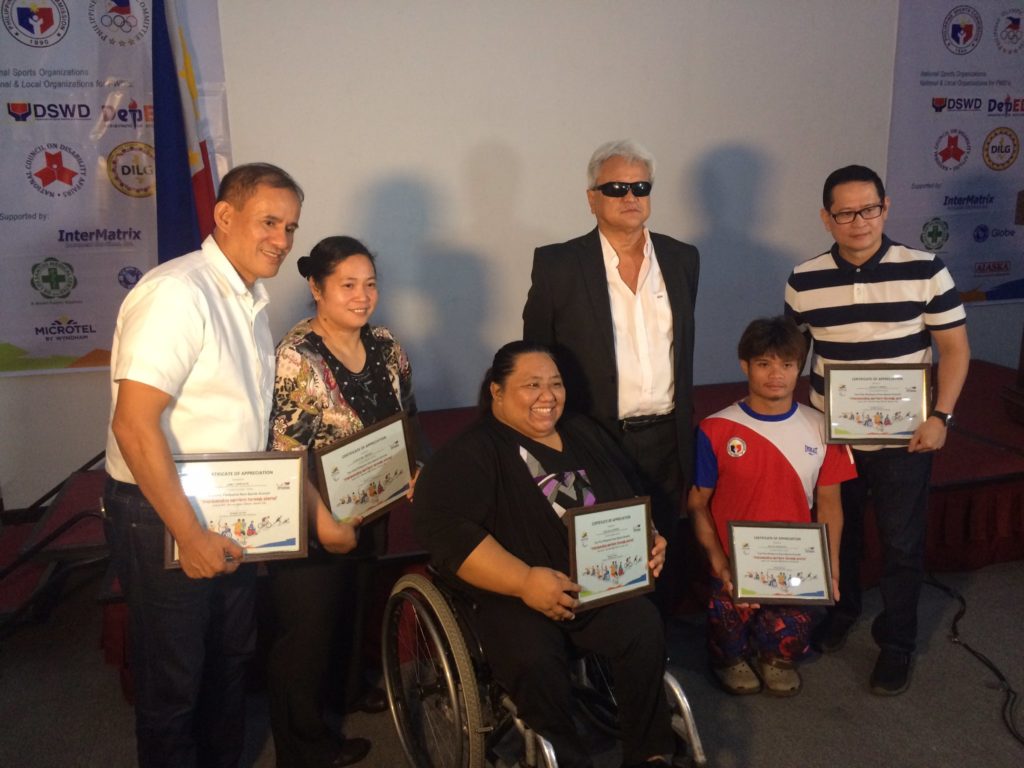
PPC-PHILSPADA president Mike Barredo recognizes the speakers, including Paralympic bronze medalists Josephine Medina and Adeline Dumapong-Ancheta. Photo by Randolph B. Leongson
Looking back, Adeline Dumapong-Ancheta says that the country has gone a long way when it comes to rewarding athletes with disabilities.
When she won the bronze medal in the 2000 Sydney Olympics, the 44-year-old powerlifter shared that she had a rude awakening when the government had little to give for her success in the international stage.
“My eyes were opened on how unfair the law is for Filipino athletes with disabilities. The Philippine Sports Commission (PSC) has already undergone a number of administrative changes, but it was always the same answer, that we are not part of the law. That made me believe and I understood that there is a need to level the structure for us disabled athletes,” she said in Filipino.
Luckily, those problems from Dumapong-Ancheta’s time is longer an issue after the passing of Republic Act 9064, also known as the Athletes’ Incentives Act, for para athletes who compete in international tiffs.
“I’m glad that now, there’s some kind of appreciation and recognition for us para athletes,” said Dumapong-Ancheta, who was one of the para athletes who gave their testimonies in the First Philippine Para Sports Summit on Friday at Microtel by Wyndham on Quezon City.
The inclusion of para athletes in the Athletics Incentives Act gave them one less to worry about, especially when it came to funding.
This allowed para athletes to give full attention to their trainings and the competitions as they continue to hoist the Philippine flag high and proud and inspire their compatriots back home.
2016 Rio Paralympic bronze medalist Josephine Medina was one of those who have capitalized on this opportunity.
“Before, I was using my hard earned money to participate in the different qualifying tournaments. But in 2016, the PWD athletes are already enjoying whole year round of allowances,” she said.
“The other countries have their own coaches and staff, but we did it all alone there, attending the technical meetings and training for the games,” said Medina. “Having disabilities is not a hindrance, but a challenge in life, and in those competitions, we’re competing there by our lonesome. With that, the Philippines gained a higher respect from the other countries.”
Dumapong-Ancheta, though, believes that the Philippine Paralympic Committee (PPC) and the Philippine Sports Association for the Differently Abled (PHILSPADA) have only scratched the surface when it comes to advancements for athletes with disabilities.
“There’s still a lot of challenges that we have to surpass, but if we’ll look at the big things, we may not move forward. So we have to take everything step-by-step and we’re looking to continue in extending the paralympic movement here in the Philippines,” she said.
“I just hope that in the next generations, the athletes that will come in after us will experience the recognition they rightfully deserve without asking.”

